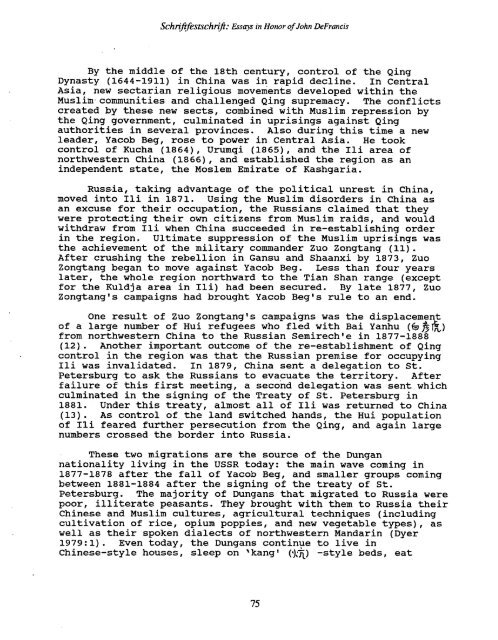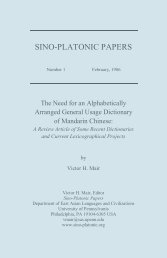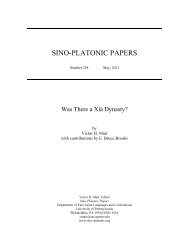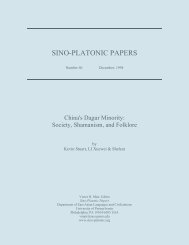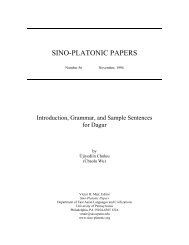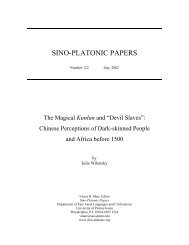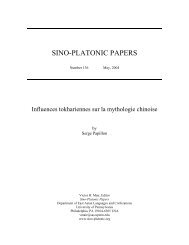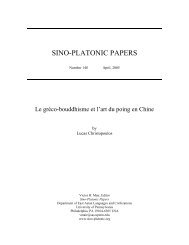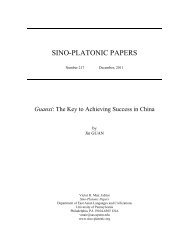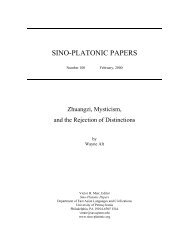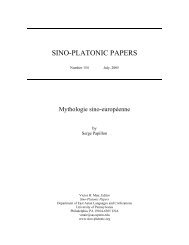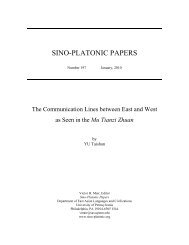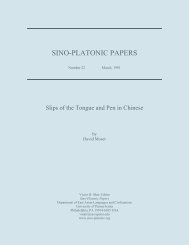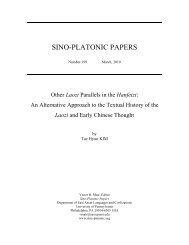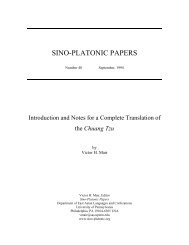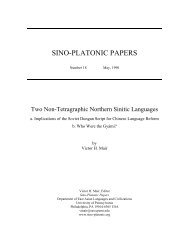Essays on Writing and Language in Honor - Sino-Platonic Papers
Essays on Writing and Language in Honor - Sino-Platonic Papers
Essays on Writing and Language in Honor - Sino-Platonic Papers
You also want an ePaper? Increase the reach of your titles
YUMPU automatically turns print PDFs into web optimized ePapers that Google loves.
Schnfjcestschn~: <str<strong>on</strong>g>Essays</str<strong>on</strong>g> <strong>in</strong> H<strong>on</strong>or of John DeFrancis<br />
By the middle of the 18th century, c<strong>on</strong>trol of the Q<strong>in</strong>g<br />
Dynasty (1644-1911) <strong>in</strong> Ch<strong>in</strong>a was <strong>in</strong> rapid decl<strong>in</strong>e. In Central<br />
Asia, new sectarian religious movements developed with<strong>in</strong> the<br />
Muslim. communities <strong>and</strong> challenged Q<strong>in</strong>g supremacy. The c<strong>on</strong>flicts<br />
created by these new sects, comb<strong>in</strong>ed with Muslim repressi<strong>on</strong> by<br />
the Q<strong>in</strong>g government, culm<strong>in</strong>ated <strong>in</strong> upris<strong>in</strong>gs aga<strong>in</strong>st Q<strong>in</strong>g<br />
authorities <strong>in</strong> several prov<strong>in</strong>ces. Also dur<strong>in</strong>g this time a new<br />
leader, Yacob Beg, rose to power <strong>in</strong> Central Asia. He took<br />
c<strong>on</strong>trol of Kucha (1864), Urumqi (1865), <strong>and</strong> the Ili area of<br />
northwestern ch<strong>in</strong>a (1866), <strong>and</strong> established the regi<strong>on</strong> as an<br />
<strong>in</strong>dependent state, the Moslem Emirate of Kashgaria.<br />
Russia, tak<strong>in</strong>g advantage of the political unrest <strong>in</strong> Ch<strong>in</strong>a,<br />
moved <strong>in</strong>to Ili <strong>in</strong> 1871. Us<strong>in</strong>g the Muslim disorders <strong>in</strong> Ch<strong>in</strong>a as<br />
an excuse for their occupati<strong>on</strong>, the Russians claimed that they<br />
were protect<strong>in</strong>g their own citizens from Muslim raids, <strong>and</strong> would<br />
withdraw from Ili when Ch<strong>in</strong>a succeeded <strong>in</strong> re-establish<strong>in</strong>g order<br />
<strong>in</strong> the regi<strong>on</strong>. Ultimate suppressi<strong>on</strong> of the Muslim upris<strong>in</strong>gs was<br />
the achievement of the military comm<strong>and</strong>er Zuo Z<strong>on</strong>gtang (11).<br />
After crush<strong>in</strong>g the rebelli<strong>on</strong> <strong>in</strong> Gansu <strong>and</strong> Shaanxi by 1873, Zuo<br />
Z<strong>on</strong>gtang began to move aga<strong>in</strong>st Yacob Beg. Less than four years<br />
later, the whole regi<strong>on</strong> northward to the Tian Shan range (except<br />
for the Kuldja area <strong>in</strong> Ili) had been secured. By late 1877, Zuo<br />
Z<strong>on</strong>gtang's campaigns had brought Yacob Beg's rule to an end.<br />
One result of Zuo Z<strong>on</strong>gtangls campaigns was the displacement<br />
of a large number of Hui refugees who fled with Bai Yanhu (6 &lf,)<br />
from northwestern Ch<strong>in</strong>a to the Russian Semirechle <strong>in</strong> 1877-1888<br />
(12). Another important outcome of the re-establishment of Q<strong>in</strong>g<br />
c<strong>on</strong>trol <strong>in</strong> the regi<strong>on</strong> was that the Russian premise for occupy<strong>in</strong>g<br />
Ili was <strong>in</strong>validated. In 1879, Ch<strong>in</strong>a sent a delegati<strong>on</strong> to St.<br />
Petersburg to ask the Russians to evacuate the territory. After<br />
failure of this first meet<strong>in</strong>g, a sec<strong>on</strong>d delegati<strong>on</strong> was sent which<br />
culm<strong>in</strong>ated <strong>in</strong> the sign<strong>in</strong>g of the Treaty of St. Petersburg <strong>in</strong><br />
1881. Under this treaty, almost all of Ili was returned to Ch<strong>in</strong>a<br />
(13). As c<strong>on</strong>trol of the l<strong>and</strong> switched h<strong>and</strong>s, the Hui populati<strong>on</strong><br />
of Ili feared further persecuti<strong>on</strong> from the Q<strong>in</strong>g, <strong>and</strong> aga<strong>in</strong> large<br />
numbers crossed the border <strong>in</strong>to Russia.<br />
These two migrati<strong>on</strong>s are the source of the Dungan<br />
nati<strong>on</strong>ality liv<strong>in</strong>g <strong>in</strong> the USSR today: the ma<strong>in</strong> wave com<strong>in</strong>g <strong>in</strong><br />
1877-1878 after the fall of Yacob Beg, <strong>and</strong> smaller groups com<strong>in</strong>g<br />
between 1881-1884 after the sign<strong>in</strong>g of the treaty of St,<br />
Petersburg. The majority of Dungans that migrated to Russia were<br />
poor, illiterate peasants. They brought with them to Russia their<br />
Ch<strong>in</strong>ese <strong>and</strong> Muslim cultures, agricultural techniques (<strong>in</strong>clud<strong>in</strong>g<br />
cultivati<strong>on</strong> of rice, opium poppies, <strong>and</strong> new vegetable types), as<br />
well as their spoken dialects of northwestern M<strong>and</strong>ar<strong>in</strong> (Dyer<br />
1979:l). Even today, the Dungans c<strong>on</strong>t<strong>in</strong>ue to live <strong>in</strong><br />
Ch<strong>in</strong>ese-style houses, sleep <strong>on</strong> \kangl (t);?) -style beds, eat


